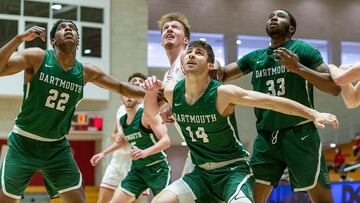NCAA BASKETBALL
Why are NCAA basketball players unionizing?
In an unprecedented move Dartmouth men’s basketball team voted to unionize, striking the first blow toward the death of amateur sports.

Depending on how you look at it, Tuesday’s vote by the Dartmouth men’s basketball team to form a union is either the herald of a bright new age in which college athletes can negotiate working conditions, pay, and scheduling or it is the first shot fired in what will inevitably be the death of college sports.
The NCAA has as its bedrock the concept of amateurism. Students must not be paid for playing sports. In recent years, that concept has come under fire, particularly with the advent of NIL rights. Already teetering, amateurism just took a heavy shot to the jaw which could see it tumble and fall.
And that is exactly what the stated purpose of Dartmouth’s vote is aiming to do.
Dartmouth juniors Cade Haskins and Romeo Myrthil led the effort for unionization. They said after the 13-2 vote, “We stuck together all season and won this election. It is self-evident that we, as students, can also be both campus workers and union members. Dartmouth seems to be stuck in the past. It’s time for the age of amateurism to end.”
The Service Employees International Union (SEIU) would wholeheartedly agree. International President Mary Kay Henry said, “These young men will go down as one of the greatest basketball teams in all of history. The Ivy League is where the whole scandalous model of nearly free labor in college sports was born and that is where it is going to die.”
One issue that may muddy the waters is that the school in question is Dartmouth, one of the elite Ivy League institutions. In fact the school leaned into this in a statement of their own, saying, “For Ivy League students who are varsity athletes, academics are of primary importance, and athletic pursuit is part of the educational experience. Classifying these students as employees simply because they play basketball is as unprecedented as it is inaccurate. We, therefore, do not believe unionization is appropriate.”
There are, of course, many questions that will go unanswered by this step. Answers to questions first raised by the NIL deliberations. Namely, that the billions of dollars that are awash of college sports are not distributed equally.
If you make athletes employees, or in other words professional, and you give that NIL money to the big stars, then what is likely to happen is that the smaller schools, smaller divisions, and smaller markets will see their athletic programs disappear altogether. Money will bring the top athletes to the top schools in the top markets. Division II and III schools will become a historical footnote.
Small schools, both private and state, will no longer be able to afford to pay for athletes to attend, endangering not only the athletic department, but the academic departments that benefit from that influx of sports dollars. The gradual but certain dumbing down of colleges and universities will be unstoppable.
The NCAA recognizes that change is needed but seems keen to get congress involved in the discussion. They released a statement reading in part, “The association believes change in college sports is long overdue and is pursuing significant reforms. However, there are some issues the NCAA cannot address alone, and the association looks forward to working with Congress to make needed changes in the best interest of all student-athletes.”
In the end, whether this union stands or fails, the writing is on the wall for the current system. As in everything in life, it comes bearing both fruit and a sting. For the top college athletes in the nation, this will address the historical exploitation that they have endured, redressing the balance and paying them their due. For everyone else, it may mean that high school is as far as you can go with sports. For those of us who played Division III sports, and consider that to be an important part of our formative years, this can’t help but be bittersweet news indeed.






